-
ITUMELENG MAKALE to mwalimubaruti, Ɔbenfo Ọbádélé, Akofena, talawa-adodogmail-com, Nkanyezi and Aviwe 3 years ago ·
3 years ago (edited)
“Are we saying having western/aKKKademic educational qualifications conferred on you is a sine qua non for you to have these Afrikan-Centred titles invoked to you as simply replacement titles? Is this not expressing subtle desperation for equivalence with things that come out of a separate epistemological culture and set of values defining its people?”
@mwalimubaruti @obadelekambon @j-africa @talawa-adodogmail-com @yezinkan @menzingcamane @aviwe
4 Comments-
Taali Mmabia 💪🏾✊🏾 On point post my brotha, you made your breakdown of this very clear and precise… I actually find brotha @kwadwo response to this post to be conflative … i dont see how the full context of what you said wasnt understood… when your post wasnt about questioning if we had terms that expressed achievement, honor.. etc.. and not that they equal them ,, but that these subtle reaches/equivalencies are a serious problem because they are bein done through the self destructive terminological replace-ism method thus painting a false reality…. nor is this post about us having orders of study begire eurasians having shoes… its clear that you are addressing things far deeper than just literal term concern.. but addressing the Asili (Genetic cultural) intestinal gut and tissue/software of the subjects entirety…. Gbansabla Yaa Mmabia itu 🔥💪🏾✊🏾
-
 119,138
Abibisika (Black Gold) Points
119,138
Abibisika (Black Gold) Points
Consider the following quote from N’kulu Ngânga Fu-Kiau. (1991). Self-Healing Power and Therapy. Baltimore, MD: Black Classic Press.
“A futu that contains mâmba [sic] ma kânda (“information that belongs to the community”) is usually known as lukobe lwa kânda (community’s lukobe). This use of the lukobe as a reliquary is passed down in the community from one generation to another. The lukobe lwa lèmba among the Kôngo belongs to this category. It is a “diploma-object” in the form of a container. Its content represents the subject matters of the teaching of Lèmba Institute. This lukobe, generally a cylindrical bark basket container into which symbolic writings or codings were kept, was a degree. This was the highest degree conferred in the Kongo system of education. The recipient then became an official and an “academically” recognized Ngânga, “doctor” or “specialist.”
In the entire Kongo system of traditional higher education, the Lèmba Institute was the only school that conferred a degree of specialization (dîmbu kia kingânga) on its students.”
Commentary: Titles such as Okunini, Okuninibaa, Ɔbenfoɔ, Ọ̀mọ̀wé, Ọ̀jọ̀gbọ́n, sbA, sbAt, n.k. are to be used for those who fight for Abibifahodie whether or not they have a university degree (n.n. Ɔbenfo Thomas Sankara, Ɔbenfo Asare (Nana Kyeame here at Akuapem Mampɔn)). No title whatsoever is to be used for sell-outs and race traitors whether or not they have a university degree (n.n. Henry Louis Gates, Jr.) unless we’ve found a fitting adjectival label of shame.
In alignment with this, to not use a title of some sort would either signify that we consider X person to be a sell-out and race traitor or that we’re using the aAmw rhetorical ethic of “egalitarianism” where aAmw children even call their parents by their first names (n.n. I hate you John! You’re ruining my life! I want a divorce from my parents!)
I hope this clears up the apparent confusion on this point.
Here are a few titles that I use and how they translate into krakkka:Agya: “Father” (Twi)
Ataa: “Father” (Ga)
Bàbá, Baba: “Father” (Yorùbá, isiZulu and various)
Babańlá “Great father” (Yorùbá)
ImAxw: “Revered one” (male) (mdw nTr)
ImAxwt: “Revered one” (female) (mdw nTr)
Jangalekat: “Teacher” (Wolof)
Kuku: “Grandmother,” “grandfather” (Oshiwambo)
Maam: “Grandfather” (Wolof)
Mama: “Mother” (Various Afrikan people)
Meme: “Mother” (Oshiwambo)
N’kulu: “Elder/Ancestor” (Kikôngo)
N’lôngi: “Teacher” (Kikôngo)
Nana: “Grandmother,” “Grandfather,” “Grandchild,” (Twi)
Nna: “Father” (Igbo)
Nswt Bity: “Ruler of Upper and Lower Kemet” (mdw nTr)
Ọ̀jọ̀gbọ́n: “Wise one” (Yorùbá)
Okunini: “Prominent one (war title)” (Twi)
Okuninibaa: “Female prominent one (war title)” (Akan)
Omufimanekwa: “The Respected one” (Oshiwambo)
Omuhongi, Omulongi: “Teacher” (Oshiwambo)
Oníṣègùn “Healer” (Yorùbá)
Ɔbenfoɔ: “Wise/skilled one” (Twi)
Ɔnyansafoɔ: “Wise one” (Twi)
Tatá, Tata: “Father” (isiXhosa, Kikôngo and various)
Tate: “Father” (Oshiwambo)
Tatekulu: “Grandfather” (Oshiwambo)
Also note that Nṯr is not “God” and should not be translated as such. Further, Mwalimu is from arabic and probably should be discussed separately from the current discussion of using indigenous titles.-
Mwalimu is from arabic, oh wow I didn’t know that.
-
 119,138
Abibisika (Black Gold) Points
119,138
Abibisika (Black Gold) Points
https://en.wiktionary.org/wiki/%D9%85%D8%B9%D9%84%D9%85
Arabic
Etymology 1
Derived from the passive participle of the verb عَلَّمَ (ʿallama, “to teach”), from the root ع ل م (ʿ-l-m).
Pronunciation
IPA(key): /mu.ʕal.lam/
Adjective
مُعَلَّم • (muʿallam) (feminine مُعَلَّمَة (muʿallama), masculine plural مُعَلَّمُونَ (muʿallamūna), feminine plural مُعَلَّمَات (muʿallamāt))
taught, schooled, instructed, educated, trained
marked, labeled, represented
Declension
Declension of adjective مُعَلَّم (muʿallam)
Etymology 2
Derived from the active participle of the verb عَلَّمَ (ʿallama, “to teach”), from the root ع ل م (ʿ-l-m).
Pronunciation
IPA(key): /mu.ʕal.lim/Noun
مُعَلِّم • (muʿallim) m (plural مُعَلِّمُون (muʿallimūn), feminine مُعَلِّمَة (muʿallima))
teacher, instructor, schoolteacher, tutor, schoolmaster, pedagogue, educator
master of a trade
navigator, a kind of compliance officer on a ship, who checks that the technical stuff is in order on the vessel
-
-
-
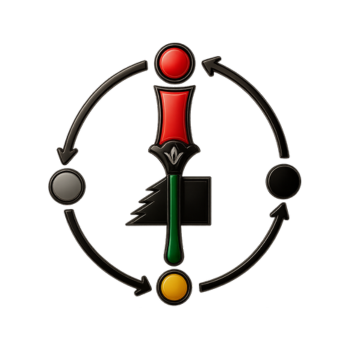
 Pair of Authentic Afrikan Masks from Ghana: cedar wood, copper, brass and cowries
Pair of Authentic Afrikan Masks from Ghana: cedar wood, copper, brass and cowries  Foundations of Afrikan=Black Thought #8: Earth and Land in African Thought and Practice (2018)
Foundations of Afrikan=Black Thought #8: Earth and Land in African Thought and Practice (2018)  YOU! SHOULD BE ASHAMED! OF YOUR NICE, BUT DUPED PARENTS! Pt 2
YOU! SHOULD BE ASHAMED! OF YOUR NICE, BUT DUPED PARENTS! Pt 2  Chanting YorùbÁkan: A Stylistic Analysis of Jími Ṣólańkẹ́’s Ọ̀nà là in “The Path”
Chanting YorùbÁkan: A Stylistic Analysis of Jími Ṣólańkẹ́’s Ọ̀nà là in “The Path” 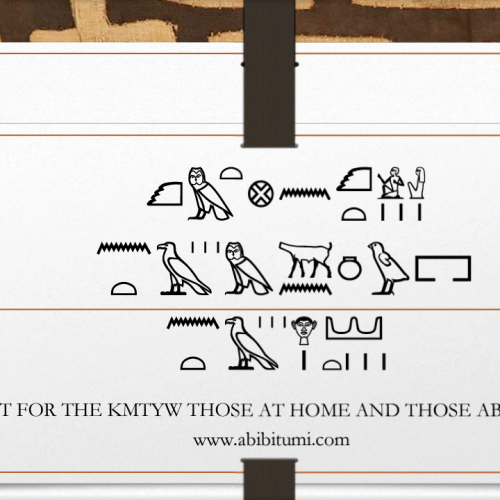 Lecture #4: Kemet for the Kemetiyu Free the Youth
Lecture #4: Kemet for the Kemetiyu Free the Youth  13,000 Years in 13 Minutes: Humanities and Sciences as Complementary Aspects of an African Whole
13,000 Years in 13 Minutes: Humanities and Sciences as Complementary Aspects of an African Whole 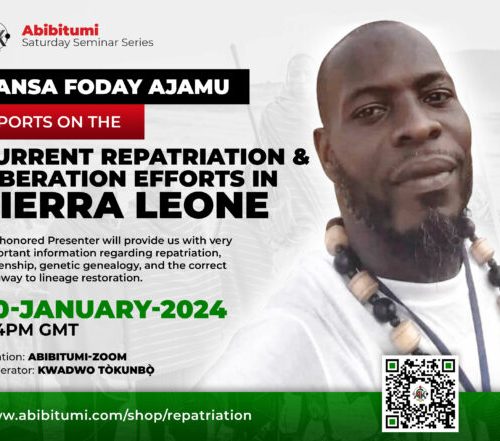 Video Recording SSS#67 Mansa Foday Ajamu Reports on the Current Repatriation & Liberation Efforts in Sierra Leone
Video Recording SSS#67 Mansa Foday Ajamu Reports on the Current Repatriation & Liberation Efforts in Sierra Leone  Replay of the Official Abibitumi.com Website Launch and 1804 Film Screening!
Replay of the Official Abibitumi.com Website Launch and 1804 Film Screening!  Recording: Intro Yoruba Class 6 Online Jan 3, 2013
Recording: Intro Yoruba Class 6 Online Jan 3, 2013  R2GH.com Eco Tote Bag
R2GH.com Eco Tote Bag  The Afrikans Who Emancipated Themselves
The Afrikans Who Emancipated Themselves 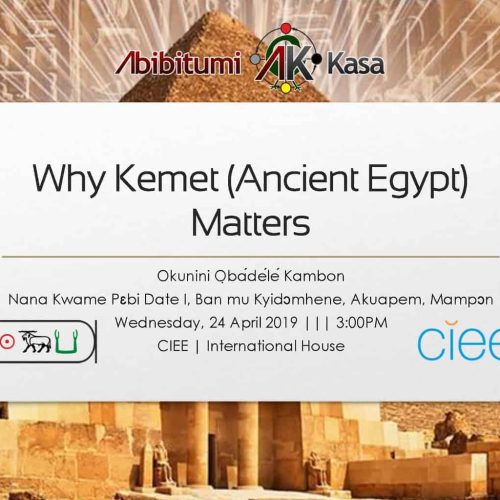 Why Kemet (Land of Black People) Matters! (Revised 2019 Edition)
Why Kemet (Land of Black People) Matters! (Revised 2019 Edition)  Akan and Yoruba Serial Verb Construction Nominals as Idioms
Akan and Yoruba Serial Verb Construction Nominals as Idioms 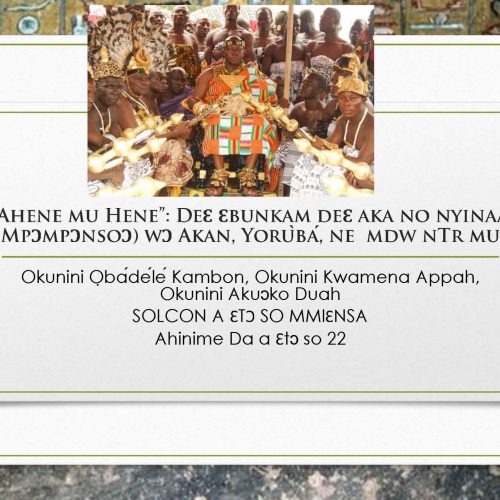 “Ahene mu Hene”: Deɛ Ɛbunkam deɛ aka no nyinaa (Mpɔmpɔnsoɔ) wɔ Akan, Yorùbá, ne mdw nTr mu
“Ahene mu Hene”: Deɛ Ɛbunkam deɛ aka no nyinaa (Mpɔmpɔnsoɔ) wɔ Akan, Yorùbá, ne mdw nTr mu ![The C.O.W.S. w/ Dr. Kamau Kambon Part X [mp3]](https://media.abibitumi.com/wp-content/uploads/2025/09/07184616/hq720-500x386.jpg) The C.O.W.S. w/ Dr. Kamau Kambon Part X [mp3]
The C.O.W.S. w/ Dr. Kamau Kambon Part X [mp3] 